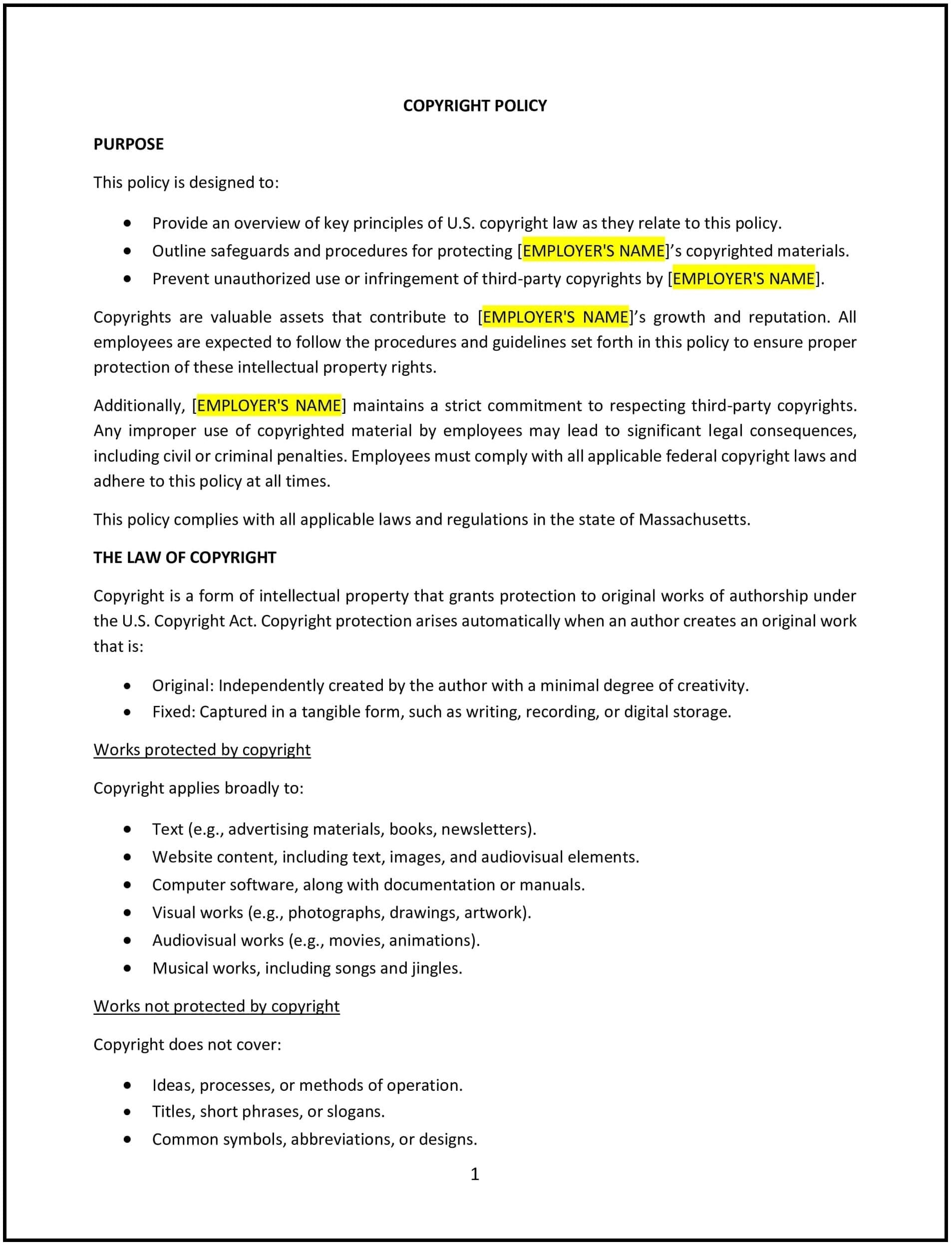Got contracts to review? While you're here for policies, let Cobrief make contract review effortless—start your free review now.

Customize this template for free
This copyright policy is designed to help Massachusetts businesses establish guidelines for respecting copyright laws and protecting intellectual property rights. The policy outlines the company’s approach to using copyrighted materials, handling infringement claims, and promoting compliance with federal and Massachusetts state copyright regulations. It also specifies how employees should handle copyrighted content in the course of their work, such as using third-party materials in marketing, publications, or other business activities.
By adopting this policy, businesses can avoid legal issues related to copyright infringement, protect their intellectual property, and promote ethical practices regarding the use of copyrighted materials.
How to use this copyright policy (Massachusetts)
- Define copyrighted content: Clearly specify what types of content are covered under the policy, including text, images, music, video, software, trademarks, and any other creative works protected by copyright law.
- Establish rules for using third-party content: Outline the process for obtaining permission or licensing third-party copyrighted content. The policy should specify when employees need to seek permission from the copyright holder or when it is acceptable to use content under fair use or similar exceptions.
- Address content creation: Define how employees should handle the creation of original content within the company. This may include guidance on assigning copyright ownership for works created during employment and the use of company-owned intellectual property.
- Outline the process for reporting copyright infringement: Establish a procedure for reporting suspected copyright infringements, whether by employees, clients, or external parties. The policy should specify how employees should submit reports and what actions will be taken by the company to address the issue.
- Specify consequences for copyright infringement: Clearly define the consequences of copyright infringement, such as disciplinary action or legal repercussions. The policy should stress that violations of copyright law can result in serious financial and legal consequences.
- Promote respect for intellectual property: Encourage employees to respect copyright laws and avoid using unlicensed content in company materials. The policy should emphasize the importance of using only legally obtained or licensed content in all business activities.
- Ensure compliance with Massachusetts and federal copyright laws: Ensure the policy complies with Massachusetts state laws, federal copyright regulations, and relevant international treaties, including the U.S. Copyright Act. The policy should also provide guidance on how the company can protect its own copyrighted works.
Benefits of using this copyright policy (Massachusetts)
This policy offers several benefits for Massachusetts businesses:
- Reduces legal risks: By following a clear copyright policy, businesses can avoid the risks associated with copyright infringement, such as lawsuits or fines, by ensuring that copyrighted materials are used correctly and legally.
- Protects intellectual property: The policy helps businesses safeguard their intellectual property, ensuring that works created by employees are protected and properly attributed.
- Enhances company reputation: A company that respects copyright law and promotes ethical use of intellectual property will be viewed positively by clients, partners, and the public. This can enhance the company’s reputation and foster trust.
- Promotes ethical practices: The policy encourages employees to respect intellectual property rights, promoting an ethical and compliant workplace culture.
- Improves operational efficiency: Clear guidelines for the use of copyrighted materials streamline workflows by setting expectations for obtaining permissions, using licensed content, and protecting original work.
- Strengthens legal compliance: By establishing a robust copyright policy, businesses can ensure compliance with Massachusetts state laws, federal copyright laws, and international copyright regulations, reducing the risk of legal penalties.
Tips for using this copyright policy (Massachusetts)
- Communicate the policy clearly: Ensure that all employees, especially those who create or use content for marketing, publishing, or product development, are aware of the copyright policy and their responsibilities.
- Provide copyright training: Offer training to employees on how to recognize copyrighted materials, how to properly request permission for use, and the importance of adhering to copyright law.
- Implement a content approval process: Establish a clear process for reviewing and approving content that will be used in the business, ensuring that only properly licensed or original materials are utilized.
- Monitor for infringement: Regularly monitor the company’s content for potential copyright violations and address any concerns as quickly as possible to mitigate legal risks.
- Review and update regularly: Periodically review and update the policy to ensure it is compliant with Massachusetts state laws, federal regulations, and any changes in industry best practices.